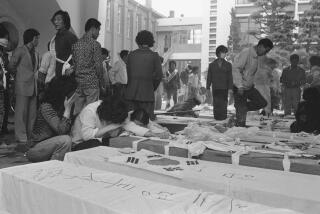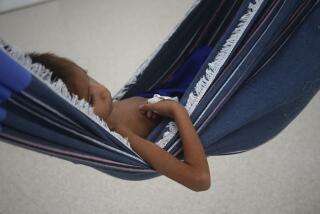A safety hazard or special treatment?
When Majed Afana needs to pray while attending classes at the University of Michigan in Dearborn, the 19-year-old Muslim usually will duck into the campus library’s bathroom, strip off his shoes and awkwardly strain to wash his feet in the sink.
Water often pools at his feet, he says, making it slippery to balance on one foot.
Some of the sinks have started to pull away from the wall, in part from years of use by others like him -- who, according to their faith, must clean their feet before praying five times a day.
So when the school recently approved installing two foot baths in a pair of new unisex bathrooms to accommodate the needs of male and female Muslim students, the local Islamic community started planning ways to raise the estimated $25,000 cost.
But the university told them not to bother -- it would pay for the foot baths.
“I think it’s great,” said Afana, a pre-med student at the commuter school, where a reported 11% of the 8,600 students are Muslim.
“What we’ve been doing all these years has been dangerous and can be a safety hazard.”
The university says it’s tapping student infrastructure fees for the unisex bathrooms, which will also have diaper-changing stations and facilities for mothers to nurse infants, because this is an issue of trying to make its bathrooms safer and improve plumbing -- not of endorsing a religion.
The fees are part of the school’s general fund, paid by students -- not by taxpayers -- and often used for campus maintenance and general construction.
“We see this as a reasonable accommodation to a customary practice of a growing number of our students and visitors on campus,” said Terry Gallagher, a university spokesman.
But critics have been flocking to conservative blogs and Michigan radio talk shows to rail against the plan.
Critics insist that such efforts are giving Islamic followers preferential treatment over other faiths.
“Plumbing? You must be kidding. That’s an after-the-fact justification for something that is being done for the purpose of meeting a religious demand,” said the Rev. Barry W. Lynn, executive director of Americans United for Separation of Church and State, a religious liberty watchdog group based in Washington.
“You start permanently changing your architecture for one religious group, you have to do it for all. After all, what’s the difference between a foot bath used as part of a ritual and a fountain that can be used for a baptism?” asked Lynn.
“Considering there are 2,000 different religious groups in America, that’s a very slippery slope.”
Yet the American Civil Liberties Union, a fierce advocate for separating church and state, seems to be giving the foot baths a nod.
Though the plan raises a red flag because it’s illegal for schools to use public funds to install religious symbols such as crucifixes, ACLU of Michigan officials said, the question of whether Muslim prayer rugs or foot baths fall into the same category remains fuzzy.
“We have never encountered a situation where the motivation seems to be a response to a practical cleanliness and safety issue,” the ACLU of Michigan said in a statement. “Indeed, if the university refused to allow Muslim students to wash their feet in the sink without there being a viable alternative, we would have concerns about whether the university was unconstitutionally interfering with students’ right to practice their religion.”
The university first considered the idea of installing the foot baths two years ago, when school officials learned that students and visitors were using regular sinks to clean their feet before praying.
Gallagher said the practice was “causing a lot of wear and tear on the library bathroom” and on a second facility near the school’s two “reflection” areas where students gather to relax. Muslim students often meet there throughout the day to pray, as do Christian organizations, he said.
What’s happening in Dearborn, a suburb of about 96,600 west of Detroit, is part of a national trend, as a number of public schools seek to meet the needs of Muslim students.
At least nine universities in the U.S. have rooms on campus dedicated to Muslim prayers, and more than a dozen schools have either installed foot baths like the ones proposed in Dearborn or are in the process of constructing them, according to Farhan Latif, a University of Michigan graduate student and advisor to the Muslim Students’ Assn. at the Dearborn campus.
“We are a multicultural campus and need to reflect that,” said Latif, who also works as an admissions counselor on campus.
“What’s the big deal?”
Countered Daniel Pipes, director of the Middle East Forum, a conservative think tank based in Philadelphia: “Muslims have the same rights and obligations as other citizens.
“But they don’t have special rights ... and this is clearly a religious accommodation.”
More to Read
Start your day right
Sign up for Essential California for news, features and recommendations from the L.A. Times and beyond in your inbox six days a week.
You may occasionally receive promotional content from the Los Angeles Times.






